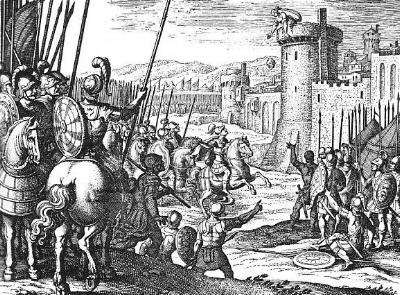Grace unto you, and peace, from God our Father and the Lord Jesus Christ
The Fifteenth Sunday after Trinity
KEEP, we beseech thee, O Lord, thy Church with thy perpetual mercy; and, because the frailty of man without thee cannot but fall, keep us ever by thy help from all things hurtful, and lead us to all things profitable to our salvation; through Jesus Christ our Lord. Amen.
Source: Bishop Gelasius [494]. Jesus promised us the help of the Holy Spirit to comfort and guide us [Jn 14:26]. In 1 Corinthians 13 Paul tells us it is charity that is profitable. [Barbee & Zahl]2Kings xxv, Psalm 97,98 | 79, 80, Galatians vi. 11 & St. Matthew vi. 24 Homily of Augustine on Psalm LXXIX And all the army of the Chaldees, that were with the captain of the guard, brake down the walls of Jerusalem round about.
WEEKLY BULLETIN
calendar
Eudoxius, Comitus Hegemon (general), Zeno, Macarius, & Companions - Martyrs -- September 6th (285-305)news
President Bush proclaims national days of prayer, 5-7 September
commentary
The Psalm appointed for this week is LXXIX. It is post-exilic and refers to the account found in the Lesson from 2nd Kings and the defeat at the hands of the Chaldeans and exile to Babylon
Augustine explains the psalm through the eyes of a Christian as a prophesy of the destruction of Jerusalem that came at the hands of Rome in 70 AD.
"They have defiled Thy holy Temple, they have made Jerusalem for a keeping of apples." … If in this prophecy any one of us shall have thought that there must be understood that laying waste of Jerusalem, which was made by Titus the Roman Emperor, when already the Lord Jesus Christ, after His Resurrection and Ascension, was being preached among the Gentiles, it doth not occur to me how that people could now have been called the inheritance of God, as not holding to Christ, whom having rejected and slain, that people became reprobate, which not even after His Resurrection would believe in Him, and even killed His Martyrs. For out of that people Israel whosoever have believed in Christ; to whom the offer of Christ was made, and in a manner the healthful and fruitful fulfillment of the promise; concerning whom even the Lord Himself saith, "I am not sent but to the sheep which have been lost of the house of Israel," the same are they that out of them are the sons of promise; the same are counted for a seed"
Titus' siege of Jerusalem occurred when the pilgrims had crowded the city for the Feast of Passover. One million perished. We know that Jesus foretold of this event in Matthew 24, and understand by tradition that the Church fled the city.
Augustine raises the important theological issue of God's election of certain of the house of Israel to be the "sons of promise," and them he spared. God is acting in his True Church today in the same way with his elect, who know the voice of their Master, endeavor to faithfully follow his commandments, and look with hope for their deliverance, salvation, and final bodily resurrection.
Finally, the psalm ends with this imprecatory petition.
For the blasphemy wherewith our neighbours have blasphemed thee, reward thou them, O Lord, sevenfold into their bosom. So we, that are thy people, and sheep of thy pasture, shall give thee thanks for ever, and will alway be showing forth thy praise from generation to generation
.Finis
--
PRIMUS PILUS
"Let us therefore follow after the things which make for peace, and things wherewith one may edify another" [St. Paul's Epistle to the Romans 14:19]
IN HOC SIGNO VINCES - TIME DEUM ET OPERARE IUSTITIAM
primus.pilus@gmail.com


